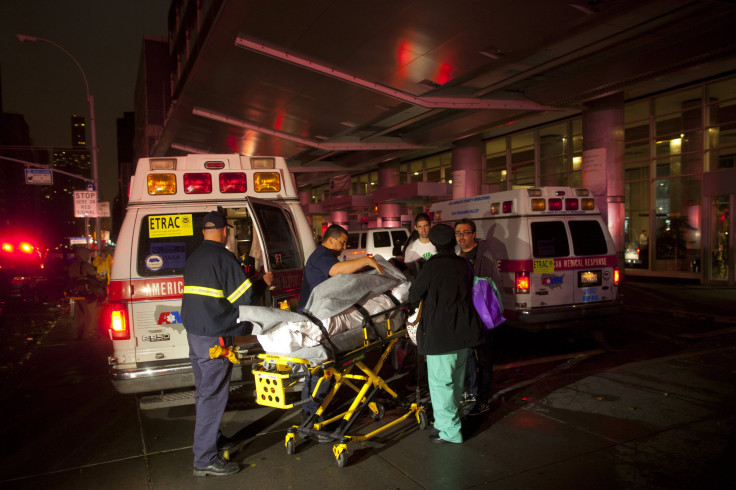Hospitals Battled to Protect Patients as Sandy Raged

At one New York hospital where backup generators failed, staff carried premature babies down more than a dozen flights of stairs in one of the more dramatic moments for healthcare workers during powerful storm Sandy.
Record flooding and power outages across the northeastern United States made for a long night caring for the most critically ill, as several hundred patients were evacuated in New York City, day-time hospital staff slept overnight on vacant beds and less urgent procedures were postponed.
From Maryland to Massachusetts, hospitals large and small had prepared for the worst as the storm approached, stocking up on supplies and ensuring backup power generators were ready. At least 30 people were reported killed by the storm, and millions left without power.
In its aftermath on Tuesday, many hospitals were still limiting care to the neediest patients, canceling chemotherapy sessions and elective surgeries and anticipating a new influx to emergency rooms as travel conditions improved.
New York University's Langone Medical Center near the city's East River was one of the hardest hit as eight feet of water flooded its basement. It evacuated all 215 patients, including critically ill infants, when its backup generator failed.
"It is a very long operation because they have to hand move every patient. There are no elevators and some of the patients are on the 15th floor," said hospital spokeswoman Lorinda Klein. "All the patients have been safely transported ... the nurses had battery-operated machinery for patients that needed that level of care."
Nearby Bellevue Hospital also grappled with a power outage and visitors on Tuesday were turned away at the door as many hallways remained dark, though a receptionist assured them that patients "are okay and have lights."
The Manhattan Veteran Affairs Hospital and the New York Downtown Hospital, both in low-lying areas of lower Manhattan, evacuated patients before the storm hit. Other city hospitals picked up the slack, including Beth Israel Medical Center, where one student nurse said nurses had stayed put at the hospital since Sunday, with some working multiple shifts.
Dr. Adam Levine, an attending physician at Rhode Island Hospital's emergency room, began to see patients injured in the storm overnight.
"I treated a man who was driving and had to stop very suddenly when a branch crashed into his front windshield," he said. While many people tried to wait out the night with whatever ailed them, some took the risk to drive to the hospital. "We admitted one woman who relies on home health care attendants and when they could not come to her she had to come to the hospital and be admitted because there was no one to care for her," he said.
PLUGGING UP WINDOWS
In tiny Crisfield, Maryland, on the eastern shore of the Chesapeake Bay, McCready Memorial Hospital claims to be the smallest hospital in the state of Maryland with only half a dozen beds.
Situated at sea level on a tiny peninsula, the hospital faced a 6-foot storm surge and wind-driven rain that brought water into the building as power from the electrical main flickered off and on.
"We're at sea level, so it doesn't take much to get right up close. We're up high enough so water didn't enter the building through any doors. But it did enter through some windows," said Shane Kelley, who handles community outreach for McCready.
Kelley said staff plugged the leaking windows with towels and used large commercial vacuums to clear water before closing off rooms. While no new patients showed up for emergency care during the storm, McCready had 11 emergency room visitors before noon on Tuesday, mainly elderly people who waited out the storm before seeking care for hypothermia and respiratory problems.
"We remained open throughout the storm. We did have to go onto our generator several times throughout the storm. We did lose power. At this point, we're all here as a team and able to accept any patient who needs our help," said Kelley.
St. Vincent's Medical Center in Bridgeport, Connecticut, closed its chemotherapy infusion center and other outpatient areas and between 60 and 80 of the hospital's 2,700 staff slept in the empty hospital beds.
Danbury Hospital and New Milford Hospital, both members of the Western Connecticut Health Network, canceled outpatient services and elective services.
The 85-bed New Milford hospital lost power and fell back on a generator. The 371-bed Danbury hospital weathered the storm using a cogeneration plant, which spokeswoman Andrea Rynn said provides steam power when it needs to come off the local utility grid.



























